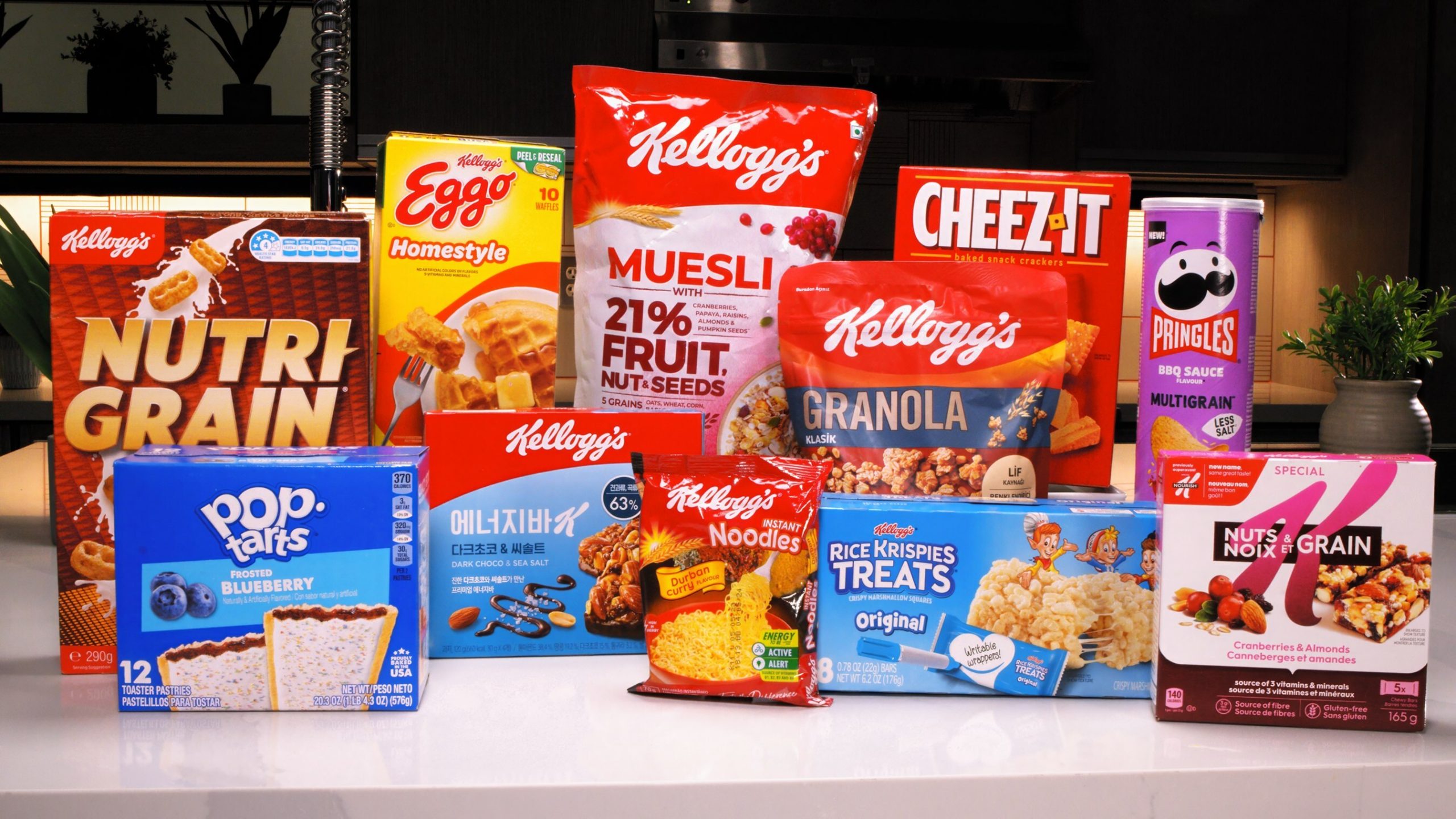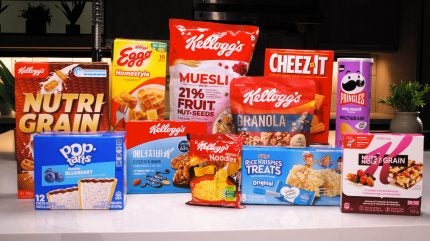

The packaged food industry is gearing up for a potential mega deal the likes of which has not been seen since the 2015 merger of Kraft Foods and HJ Heinz.
Markets were certainly cheered by the prospect, judging by the reaction in Kellanova’s share price to the weekend news Mars is interested in acquiring the US snacks giant – as sources of two media heavyweights suggested.
Kellanova shares rocketed more than 19% in pre-market New York trading on Monday (5 August) and held double-digit increases all day to close 16% higher at $73.20, despite a wider stock market sell-off amid US recession concerns.
The reaction might have been hefty for Mars too, were it not that the snacks, confectionery and pet-food business is privately owned. Mars is no stranger to acquisitions, striking a number of recent deals, but an approach for Kellanova would likely draw the attention of competition regulators in the US.
A merger would create a business with annual sales revenue of at least $60bn. While Mars does not generally reveal its financial figures, the Snickers and Skittles brand owner said in 2022 it generates almost $45bn in net sales. Kellanova reported $13.1bn for fiscal 2023, bearing in mind the intricacies of the spin-off from Kellogg.
It’s perhaps no surprise that Kellanova might be a target for a buyout following last year’s split from Kellogg to centre on snacks, frozen foods, noodles and breakfast cereals outside of North America.
Access the most comprehensive Company Profiles
on the market, powered by GlobalData. Save hours of research. Gain competitive edge.

Company Profile – free
sample
Your download email will arrive shortly
We are confident about the
unique
quality of our Company Profiles. However, we want you to make the most
beneficial
decision for your business, so we offer a free sample that you can download by
submitting the below form
By GlobalData
After all, the Special K brand owner had put its MorningStar Farms plant-based business up for review and a potential sale before deciding to keep it. North America cereal is now managed by WK Kellogg, the other entity to emerge from the group spin-off.
It would also have been a timely bit of PR on the part of Kellanova last Thursday, as the Pringles and Cheez-IT snack brand owner upped its sales and EPS outlook for the year. Three days later, the acquisition murmurings emerged.
Valuation bets
Potential valuations for Kellanova are equally hefty, should a deal be struck, and pale into insignificance compared to the triple-digit-millions Mars has paid for US businesses such as Kevin’s Natural Foods, Trü Frü and Nature’s Bakery – that transaction initiated through another acquisition, Kind snacks.
Sources for The Wall Street Journal suggested a price tag of up to $30bn, which would far out trump another significant industry deal – JM Smucker’s purchase of US indulgent snacks maker Hostess Brands last year for $5.6bn.
Analysts at AllianceBernstein, led by Alexia Howard, said such a valuation might be a bit wayward given Kellanova’s current enterprise value of $27.8bn
“This seems low since this would imply less than a 10% premium to the current share price,” Howard wrote.
“We’d likely expect a somewhat higher valuation – at minimum a 15-20% premium to the current stock price and potentially more like a 25-30% control premium might materialise, particularly if Mars wishes to deter other potential acquirers from stepping in.”
That was an angle put forward by Reuters’ sources, who suggested ‘another suitor could also approach Kellanova’, although there is no certainty a deal could be reached with any party, they added.
Howard contests, however, that such a scenario is doubtful, especially if interest was expressed by other US heavyweights in similar categories because of regulatory competition barriers.
“As a global snacking company, Mars makes sense as a potential suitor, and there really aren’t many other companies on the list,” Howard said.
“PepsiCo would likely have too many anti-trust issues given its global salty snacks presence. And the only other sweet snacking company with a global footprint would be Mondelez, but we think it unlikely that the management team at Mondelez would be interested in pursuing such a large-scale deal.”
Howard and the AllianceBernstein team also contend that an approach by Mondelez for Kellanova would trip over any potential future snacks business combination with PepsiCo, if such an event ever materialised or is even envisaged.
“We have long thought that a merger between Frito Lay and Mondelez would be the ultimate global deal to merge salty and sweet snacks, which would be thwarted by Mondelez buying Kellanova since it would create anti-trust problems for any future deal with PepsiCo,” she said.
Consolidation murmurs
In the wider scheme of things, the excitement around the supposed Mars takeover talks have given rise to speculation of further consolidation in the packaged food industry, particularly as sentiment improves in the global investment landscape.
Robert Moskow, an analyst at another US investment bank, TD Cowen, picked up on the theme in the slipstream of the Mars-Kellanova market talk.
“We believe that Kellanova’s portfolio of popular snack brands will fit well with Mars’ and help them expand scale in international markets,” Moskow wrote.
“The merger could usher in another cycle of consolidation in the packaged foods space similar to 1999-2001, thus providing a boost to valuations.”
Similarly, analysts at Stifel suggest a Mars-Kellanova deal could open the doors to more food industry M&A as an avenue to boost growth in the diminishing pricing era as the emphasis switches to volume recovery.
“We believe the pipeline for potential M&A of packaged foods businesses is very full, however we have seen relatively few transactions over the past two years,” the team at the US investment bank wrote.
“With strong balance sheets across industry, we believe companies will continue to use M&A and divestitures to improve the growth profile of their portfolios.
“With a limited number of completed transactions, we believe valuation spreads remain wide, with a focus on upcoming potential deals to break the dam.”
AllianceBernstein’s Howard agrees, saying a potential Mars-Kellanova merger “could have broader implications for consolidation across the packaged food space”.
She adds: “It’s possible that a deal of this magnitude could attract more activist investor interest in pushing for further consolidation across the packaged food space, since US food remains a far more fragmented space than other staples sectors in the developed markets.”
“Juggernaut brands”
Howard suggests a Mars-Kellanova deal would “seem to make strategy sense” post the spin-off into a more snacks-centric company.
“It’s perhaps not surprising that Kellanova may have become an acquisition target since it shed its poor-performing North American cereal business last fall, since it is now a more attractive company with a more global footprint and far higher exposure to snacking.”
From a Mars’ perspective, she said Kellanova’s snacks business would be a nice fit, although the former’s recent acquisitions have tended to focus on the healthy snacking segment rather than salty varieties like Pringles.
Nevertheless, Howard adds “the possibility of acquiring juggernaut brands like Pringles and Cheez-It is probably what has drawn Mars to the negotiating table”.
The Stifel team suggests a merger would create a type of powerhouse across food segments like pet and snacking, while also bolstering the geographic presence.
Mondelez, for instance, generated sales of $36bn in its 2023 financial year, more than triple Hershey’s $11.1bn. PepsiCo is far larger given its soft drinks business, posting total group revenue of $91.4bn. Its Frito-Lay snacks division in North America contributed $24.9bn.
“We believe a transaction would further validate the power of Kellanova’s brands and growth potential, both in North America and internationally,” the Stifel team said.
“The transaction would combine Mar’s snacking and pet-oriented portfolio with a scaled snacking business in North America and Europe. Kellanova operates across several temperature states in North America, providing further scale for Mars’ existing food and pet brands.”

